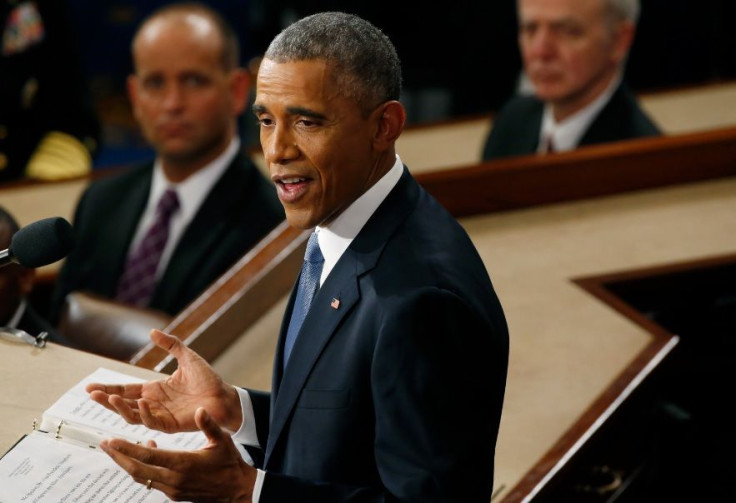Obama Boasts Increase In Domestic Energy Production, But Saudi Arabia Is Keeping Prices Low

The price of a barrel of crude, which was higher than $90 last January, fell to less than $47 this week, a five-year low that will put almost $750 per household a year back into the pockets of U.S. consumers, President Barack Obama said in his State of the Union address Tuesday night. Obama credited the dip to America's increasing reliance on domestic oil, but the decrease in oil price is due largely to the second-biggest oil producer in the world, Saudi Arabia.
“Thanks to lower gas prices and higher fuel standards, the typical family this year should save $750 at the pump,” Obama said. But consumers aren’t saving solely because of the increase of domestic oil and gas production. The big dip in the price of crude oil was the result of Saudi Arabia’s manipulation of the oil market for political gain.
For weeks now, Saudi Arabia has blocked the Organization of the Petroleum Exporting Countries from cutting production targets in the face of an oil-supply glut, which has negatively affected Venezuela, Russia and Iran.
Oil makes up the largest piece of the total world energy consumption pie at 34 percent, followed by coal and gas. And Saudi Arabia controls the global oil market because it not only pumps a lot of crude every day but also has the financial ability to absorb the shock of lower oil prices -- in stark contrast to its chief regional adversary, Iran. And so Saudi Arabia, the leading oil producer in OPEC, which accounts for about 73 percent of the world’s proven oil reserves, is once again a hugely relevant global player.
The Saudis have political incentives to keep prices low. By doing so, they punish Russia and Iran for supporting President Bashar Assad’s regime in the Syrian Civil War. Like its ally the U.S., Saudi Arabia has invested substantial financial and political capital to train and equip the moderate rebels who are fighting against Assad.
While Saudi Arabia’s oil pricing power has pushed the price of oil down, the U.S. has increased its reliance on domestic oil and gas.
“We are as free from the grip of foreign oil as we’ve been in almost 30 years,” Obama said in his speech. “We believed we could reduce our dependence on foreign oil and protect our planet. And today, America is No. 1 in oil and gas.”
Earlier this year, the U.S. Energy Information Administration (EIA) said the U.S. would become the leader in crude oil production and would see a 45-year-high in 2015. The EIA also estimated the global demand for crude oil to rise a million barrels per day this year and next year.
The U.S. has increased its production of both crude oil and petroleum liquefied gas in the last year, partially due to a rise in hydraulic fracturing, or “fracking” in an area from Pennsylvania to Ohio.
This week alone, the U.S. produced 9,192 thousand barrels of crude oil per day, which is a 12.6 percent increase from the same time last year. U.S. stockpiles of crude oils reached roughly 390.2 million barrels this week, according to a report from Bloomberg News.
According to Business Insider on Tuesday, the price of West Texas Intermediate crude oil fell more than 5 percent, to less than $46.50 a barrel. But at that price, domestic production could start falling. Scotia Bank has estimated oil produced through fracking needs to sell for $69 a barrel to break even, and oil field services companies like Halliburton and Baker Hughes have begun announcing layoffs.
© Copyright IBTimes 2024. All rights reserved.





















